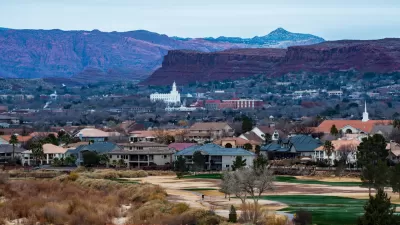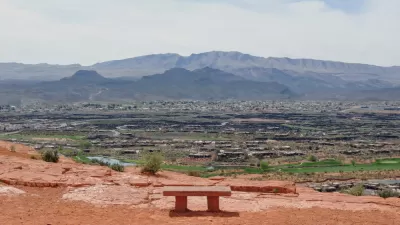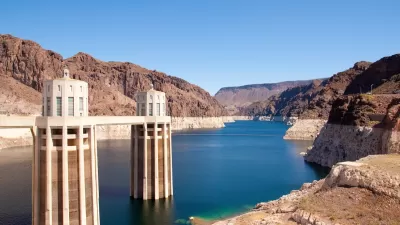After a year of contentious negotiations, Western states dependent on the river’s water supply are nearing a deal that would reduce water use significantly over the next three years.

California, Arizona, and Nevada are close to reaching a deal to protect the Colorado River’s threatened water supply. According to an article by Joshua Partlow in The Washington Post, the Lower Basin states have so far been reluctant to submit feedback on the federal government’s proposed alternatives, claiming they can come to an agreement of their own.
As Partlow explains, “The consensus emerging among these states and the Biden administration aims to conserve about 13 percent of their allocation of river water over the next three years and protect the nation’s largest reservoirs, which provide drinking water and hydropower for tens of millions of people.”
The proposed deal would cut back roughly 3 million acre-feet of water in the next three years in exchange for federal funding from the Inflation Reduction Act. Despite contentious negotiations between California and Arizona, the river’s top users, over the past year, “these states now appear more united than ever and are closing their differences with the federal government, even as significant issues remain unresolved.”
After a historically wet winter, the river’s reservoirs are in less dire condition than they were last year, but officials from Upper Basin states (Colorado, New Mexico, Utah and Wyoming) want to see more binding commitments to conservation from Lower Basin states. Becky Mitchell, Colorado’s representative in the negotiations, insists that the states need to reevaluate their relationship with the river, saying that “the enemy is not any organization, agency or part of the basin.” Rather, “The enemy is the old way.”
More background on the Colorado River crisis:
FULL STORY: States near historic deal to protect Colorado River

Planetizen Federal Action Tracker
A weekly monitor of how Trump’s orders and actions are impacting planners and planning in America.

Congressman Proposes Bill to Rename DC Metro “Trump Train”
The Make Autorail Great Again Act would withhold federal funding to the system until the Washington Metropolitan Area Transit Authority (WMATA), rebrands as the Washington Metropolitan Authority for Greater Access (WMAGA).

DARTSpace Platform Streamlines Dallas TOD Application Process
The Dallas transit agency hopes a shorter permitting timeline will boost transit-oriented development around rail stations.

San Francisco's School District Spent $105M To Build Affordable Housing for Teachers — And That's Just the Beginning
SFUSD joins a growing list of school districts using their land holdings to address housing affordability challenges faced by their own employees.

Car-Centric LA Suburb Looks to a Train-Oriented Future
City leaders in Rancho Cucamonga, the future western terminus of the Brightline West rail line to Las Vegas, want to reimagine the city as a transit-oriented, pedestrian-friendly community.

New Alaska Bitcoin Mine Would Burn as Much Energy as the State’s Largest Coal Plant
Fueled by “stranded” natural gas, the startup hopes to become the largest in the US, and to make Alaska an industry center.
Urban Design for Planners 1: Software Tools
This six-course series explores essential urban design concepts using open source software and equips planners with the tools they need to participate fully in the urban design process.
Planning for Universal Design
Learn the tools for implementing Universal Design in planning regulations.
Municipality of Princeton
Roanoke Valley-Alleghany Regional Commission
City of Mt Shasta
City of Camden Redevelopment Agency
City of Astoria
Transportation Research & Education Center (TREC) at Portland State University
US High Speed Rail Association
City of Camden Redevelopment Agency
Municipality of Princeton (NJ)





























